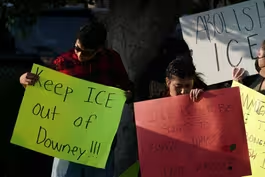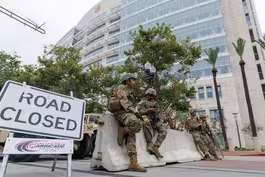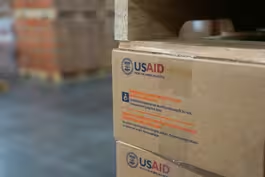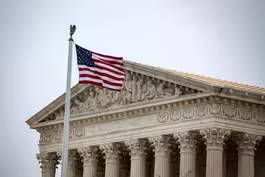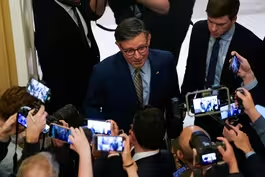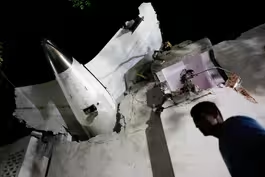
Trump: Israeli strike on Iran 'could very well happen'
Clip: 6/12/2025 | 5m 22sVideo has Closed Captions
Israeli strike on Iran’s nuclear sites 'could very well happen,' Trump says
President Trump is downplaying the likelihood of an imminent Israeli strike on Iran’s nuclear sites, but he's also warning Americans in the region to leave, citing the risk of conflict. His comments follow a vote by the U.N. nuclear watchdog declaring Iran in violation of its non-proliferation commitments. Geoff Bennett discussed more with David Sanger.
Problems playing video? | Closed Captioning Feedback
Problems playing video? | Closed Captioning Feedback
Major corporate funding for the PBS News Hour is provided by BDO, BNSF, Consumer Cellular, American Cruise Lines, and Raymond James. Funding for the PBS NewsHour Weekend is provided by...

Trump: Israeli strike on Iran 'could very well happen'
Clip: 6/12/2025 | 5m 22sVideo has Closed Captions
President Trump is downplaying the likelihood of an imminent Israeli strike on Iran’s nuclear sites, but he's also warning Americans in the region to leave, citing the risk of conflict. His comments follow a vote by the U.N. nuclear watchdog declaring Iran in violation of its non-proliferation commitments. Geoff Bennett discussed more with David Sanger.
Problems playing video? | Closed Captioning Feedback
How to Watch PBS News Hour
PBS News Hour is available to stream on pbs.org and the free PBS App, available on iPhone, Apple TV, Android TV, Android smartphones, Amazon Fire TV, Amazon Fire Tablet, Roku, Samsung Smart TV, and Vizio.
Providing Support for PBS.org
Learn Moreabout PBS online sponsorshipGEOFF BENNETT: President Trump is downplaying the likelihood of an imminent Israeli strike on Iran's nuclear sites, but he's also warning Americans in the region to leave, citing the risk of conflict.
His comments follow a vote by the U.N. nuclear watchdog declaring Iran in violation of its nonproliferation commitments.
Here's what the president said earlier today.
DONALD TRUMP, President of the United States: Well, I don't want to say imminent, but it looks like it's something that could very well happen.
Look, it's very simple, not complicated.
Iran cannot have a nuclear weapon.
Other than that, I want them to be successful.
I want them to be tremendous.
We will help them be successful.
We will trade with them.
We will do whatever is necessary.
I want to have an agreement with Iran.
We're fairly close to an agreement.
As long as I think there is an agreement, I don't want them going in, because I think That would blow it.
Might help it, actually, but it also could blow it.
There's a chance of massive conflict.
We have a lot of American people in this area.
And I said, we got to tell them to get out because something could happen soon.
GEOFF BENNETT: For insight, we turn now to David Sanger, New York Times White House and national security correspondent.
Thank you for being with us.
So, based on your reporting, what indicators point to this being a near-term decision for Israel?
And what should we make of the contradictory signals coming from the White House?
DAVID SANGER, The New York Times: Well, thanks for having me on.
So the Israelis have been threatening for months now to take military action because Prime Minister Benjamin Netanyahu believes this is a unique moment of vulnerability for the Iranians.
Israel knocked out many of their air defenses back in October during those missile exchanges, you may recall.
Obviously, Hamas and Hezbollah are no longer in a position to respond to any kind of attack on Iran by taking it out on Israel.
So, the position that the Israeli government has taken is, you will never have a chance like this again and that the Iranians will rebuild.
President Trump has been saying, look, let's give diplomacy one last chance here.
And his special envoy, Steve Witkoff, turned in a proposal to the Iranians a few weeks ago that would have gradually weaned them of their own enrichment of uranium and turned all of this over to an international consortium that Iran would be a member of, but it wouldn't be producing on Iranian soil.
And the Iranians rejected that.
And so now the question is, what are the Israelis doing?
Are they really about to attack?
Or are they creating a condition that will allow Mr. Witkoff to go back on Sunday and say, look, you're going to give this up diplomatically or you're going to lose it militarily?
GEOFF BENNETT: Well, if Israel acts unilaterally, what's the risk that U.S. military forces in the region get drawn into this conflict?
DAVID SANGER: Very high.
Almost every time there has been modeling of what happens, even if Israel goes at this alone, it usually comes out with the U.S. getting involved, either because the Iranians attack U.S. bases in the region, which they have threatened to do in this case, or because they attack Israel and the United States steps in to defend its ally.
I don't think President Trump wants to go do that.
And one of the differences between this and the Iran crises of a decade ago is that the Arab states also want to keep the region pretty peaceful right now and don't view the Iranian nuclear threat as quite as imminent or actually focused on them.
But the fact of the matter is that, if you just read the International Atomic Energy Agency reports, Iran now has the fuel to make about 10 nuclear weapons, and they would get the fuel together in fairly short order, a matter of weeks.
It could take months or a year to actually fabricate that into a working weapon.
GEOFF BENNETT: Well, in the context of past Middle East crises, how significant is this moment?
DAVID SANGER: It's a pretty significant one, but do remember that Prime Minister Netanyahu has gone right to the edge of attacking Iran and its facilities several times before, and always pulled back.
Now, the conditions, the strategic conditions, as I said, are very different, and his political base is very different here.
He's on pretty thin ice with his own coalition right now, and this might be a way of sort of unifying them.
On the other hand if he goes in without American support on the initial attack, there's a limited amount of damage he could do to the Iranian nuclear facilities.
The ones that are deep underground, half-a-mile or so, in a mountain called Fordow, the Israelis probably cannot reach.
And so then the question is, if you have only set them back a year or a year-and-a-half, two years, is it worth the enormous risk of triggering another regional war?
GEOFF BENNETT: David Sanger, thank you so much for bringing some context and clarity to this.
We appreciate it.
DAVID SANGER: Thank you.
Downey residents react as immigration raids shake community
Video has Closed Captions
Clip: 6/12/2025 | 6m 41s | Downey residents react after immigration raids shake Hispanic-majority community near LA (6m 41s)
Federal judge hears Calif. challenge to Trump's deployment
Video has Closed Captions
Clip: 6/12/2025 | 5m 57s | Federal judge hears California challenge to Trump's National Guard deployment (5m 57s)
How USAID cuts are impacting the fight against HIV in Kenya
Video has Closed Captions
Clip: 6/12/2025 | 11m 12s | How USAID cuts are impacting the fight against HIV in Kenya (11m 12s)
News Wrap: Supreme Court decisions favor individuals
Video has Closed Captions
Clip: 6/12/2025 | 6m 20s | News Wrap: Supreme Court delivers decisions favoring individuals over institutions (6m 20s)
Sen. Padilla forcibly removed from DHS news conference
Video has Closed Captions
Clip: 6/12/2025 | 5m 13s | What lawmakers said about Sen. Padilla being forcibly removed from DHS news conference (5m 13s)
Video shows moments leading to Air India crash
Video has Closed Captions
Clip: 6/12/2025 | 7m 3s | Video shows moments leading to Air India crash that killed more than 240 (7m 3s)
'We stand up for our neighbors,' San Antonio mayor says
Video has Closed Captions
Clip: 6/12/2025 | 4m 17s | 'We stand up for our neighbors,' San Antonio mayor says of protests against ICE raids (4m 17s)
Providing Support for PBS.org
Learn Moreabout PBS online sponsorship
- News and Public Affairs

FRONTLINE is investigative journalism that questions, explains and changes our world.

- News and Public Affairs

Amanpour and Company features conversations with leaders and decision makers.












Support for PBS provided by:
Major corporate funding for the PBS News Hour is provided by BDO, BNSF, Consumer Cellular, American Cruise Lines, and Raymond James. Funding for the PBS NewsHour Weekend is provided by...
